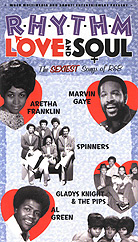May 2003
One of the pledge gifts was this three-disc set, but if you missed the show you can get one through your favorite retailer. Do we really need another boxed set of soul music? If it’s as intelligently compiled as this one, you bet. It was put together by Richard Foos, Garson Foos, and T.J. Lubinsky (who produced the television special). Richard Foos was one of the co-founders of Rhino Entertainment, so it shouldn’t be surprising that he and his partners know their way around a soul compilation. Rhythm, Love and Soul pulls in hits from the late '50s through to the disco era to paint a portrait of romantic soul. One of the most enjoyable aspects of the set is that it isn’t arranged chronologically. The producers have sequenced the songs for their pace and feel and that that leads to some revelatory moments. Brook Benton’s "It’s Just a Matter of Time" is followed by The Platters’ "Smoke Gets In Your Eyes" and the juxtaposition not only reinforces Benton’s reputation as a great soul smoothie, it reveals the Platters as more soulful than you might have thought. Then Edwin Starr’s "Twenty-Five Miles" comes along to cleanse your palate so you don’t overdose on sweetness. Seven years and significant production differences separate Luther Ingrams’ "If Loving You is Wrong I Don’t Want to Be Right" and Otis Redding’s "I’ve Been Loving You Too Long to Stop Now," but when you hear them side by side, you know where Ingrams got his inspiration. So it goes for the rest of the set. Great songs cut across time and differences in style to create emotional and aesthetic connections. Philip Bailey of Earth, Wind & Fire ("Reasons") calls out to Eddie Holman ("Hey There Lonely Girl") and James Brown ("Prisoner of Love") extends a hand to Al Green ("I’m Still In Love With You"). There are some pleasant surprises, too. Is it really possible that Heatwave recorded both "Boogie Nights" (mercifully, not part of this collection) and the sublime "Always and Forever"? Hearing Barry White solely on the radio all those years ago didn’t prepare me for the sonic richness of "You’re The First, The Last, My Everything." Maybe it’s just nostalgia, but I like the tune a lot more than I did then, too. Of course, I might question one or two choices. I’ll be skipping "Reunited" by Peaches and Herb and "You Don’t Have to Be a Star (To Be In My Show)" by Marilyn McCoo and Billy Davis, Jr. On the other hand, I’m very glad to have "Drift Away" by Dobie Gray, even if it isn’t particularly romantic or sexy. The mastering on Rhythm, Love and Soul is uniformly good. My guess is that the producers went to the trouble of finding first-generation sources. Some of the selections are a little trite -- it’s time to give Harold Melvin and the Bluenotes’ "If You Don’t Know Me By Now" a rest for a while, I think, and use something else from their catalog. But there are plenty of lesser-known tunes -- Isaac Hayes’ version of "Never Can Say Goodbye," Bloodstone’s "Natural High" -- to keep things from becoming too predictable. Even if you have a lot of soul compilations, as I have, you’ll probably find something here that fills a hole in your collection. Best of all, you’ll be reminded of the variety and emotional power of this vital American music. You might even fire off a check to your local PBS station. GO BACK TO: |
 Rhythm, Love and Soul
Rhythm, Love and Soul Rhythm, Love and Soul
is subtitled "The Sexiest Songs of R & B" and was produced by Shout! Records
in collaboration with WQED, Pittsburgh’s public television station. The station
produced an accompanying special, which PBS stations ran during their pledge week in
March. Anyone who has seen PBS’s pledge drive specials on doo-wop and soul can guess
what Rhythm, Love and Soul was like. There were surprises (Billy Paul looking suave
and sounding great) and disappointments (Aretha in full diva mode, The Temptations, with
only one original member, being trotted out by Motown to sing their old songs). For the
most part, though, it was an enjoyable tribute to the variety and beauty of this music.
Rhythm, Love and Soul
is subtitled "The Sexiest Songs of R & B" and was produced by Shout! Records
in collaboration with WQED, Pittsburgh’s public television station. The station
produced an accompanying special, which PBS stations ran during their pledge week in
March. Anyone who has seen PBS’s pledge drive specials on doo-wop and soul can guess
what Rhythm, Love and Soul was like. There were surprises (Billy Paul looking suave
and sounding great) and disappointments (Aretha in full diva mode, The Temptations, with
only one original member, being trotted out by Motown to sing their old songs). For the
most part, though, it was an enjoyable tribute to the variety and beauty of this music.